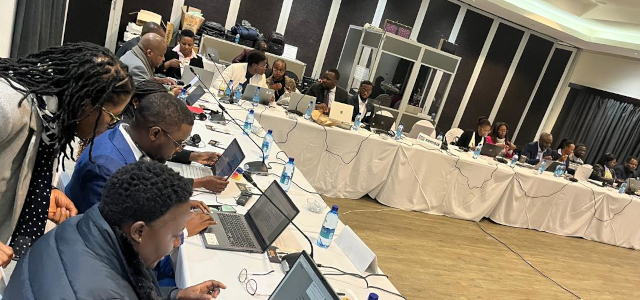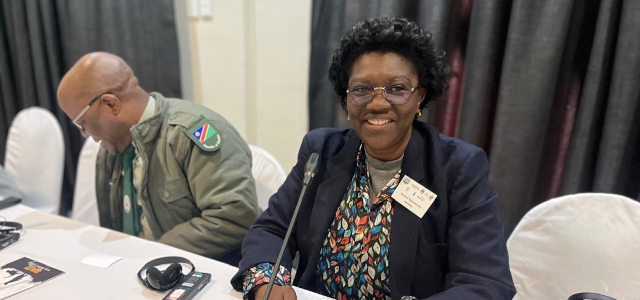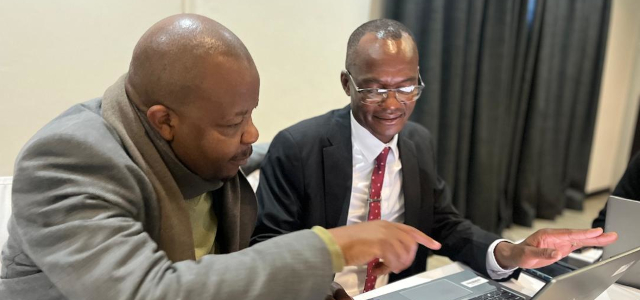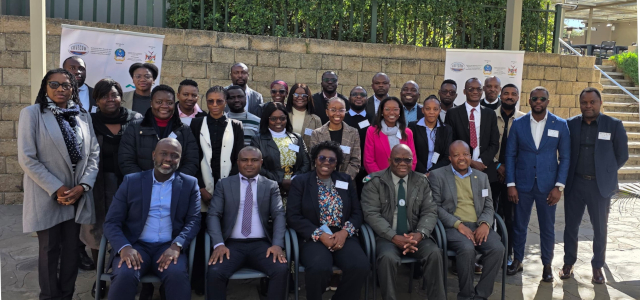The governments of Angola and Namibia have commended the progress made in the implementation of the Enhanced Water Security and Community Resilience in the Adjacent Cuvelai and Kunene Transboundary River Basins (CUVKUN) Project, noting its role in strengthening transboundary cooperation. Since its launch in May 2024, the project has been implementing a range of activities aimed at enhancing joint management, planning capacity, and practices within the Cuvelai and Kunene River Basins, which are shared by the two countries. Among its key objectives, the project also seeks to establish a joint basin management organisation.
Project stakeholders participated in two key meetings to assess the progress made since its inception from 7-8 July 2025, in Windhoek. The project is funded by the Global Environment Facility (GEF) and led by the United Nations Development Programme (UNDP) as the GEF Implementing Agency, with the Global Water Partnership Southern Africa (GWPSA) as the Executing Agency, while the Cuvelai Commission (CUVECOM) and Kunene Permanent Joint Technical Commission (PJTC) are the focal custodians of the project implementation.
The first meeting was the CUVKUN Project Steering Committee (PSC) Meeting attended by government representatives from Angola and Namibia, the UNDP, GWPSA and water sector stakeholders. The one-day session reviewed progress on the project and deliberated on strategic direction regarding the implementation of joint management of the basins.

Participants follow discussions during the meeting
"It is vital that the implementation of this project remains aligned with the ProDoc and continues to address the real needs and aspirations of both Angola and Namibia. This initiative was crafted to respond to the water governance and management challenges affecting our two adjacent basins. Therefore, its success will depend not only on technical solutions related to Integrated Water Resources Management (IWRM), but also on the strength and functionality of institutional arrangements," said Maria Amakali, Director of Water Resources Management- Ministry of Agriculture, Fisheries, Water and Land Reform, Namibia.
For the ephemeral Cuvelai River Basin, which is prone to both extreme drought and flooding, the CUVKUN project will focus on assessing groundwater potential, enhancing flood management through risk mapping, developing a flood early warning system, and promoting water harvesting solutions.
For the Kunene River Basin, the project will focus on the groundwork required for the sustainable development of the Kunene River, which has significant potential for hydropower and irrigation development. This groundwork includes a basin-wide e-flows assessment, the modelling of water resources development and management, a detailed Transboundary Diagnostic Analysis and a long-term Integrated Water Resources Management Plan.
" The Cuvelai and Kunene Basins represent much more than a geographical boundary for all of us; it symbolises interdependence, shared memory and, above all, a common future. The project that brings us together in this room is a concrete example of what we can achieve when we work together as governments, international organisations, experts, communities and civil society. This is based on mutual trust and a clear objective, to ensure water security and resilience for present and future generations," said Dr. Luzia da Conceição, Head of the Licensing, Inspection and Environment Department, Gabinete Para a Administração da Bacia Hidroeléctrica do Cunene.
The PSC meeting was followed by a high-level briefing for the CUVKUN Project on 8 July, to update the Commissioners of the Cuvelai and Kunene basins on the progress. The briefing brought together delegations from the two Member States of Angola and Namibia, the UNDP, and GWPSA to appreciate the project's progress to date.. The meeting was a joint session of CUVECOM and the PJTC, and featured presentations and discussions regarding current progress and an overview of planned project activities.
Both countries underscored the importance of the project and affirmed continued support for the partnership.

Mrs. Ndiyakupi Nghituwamata, the Executive Director at the Ministry of Agriculture, Fisheries, Water and Land Reform of Namibia, said that the CUVKUN Project is more than a technical or development intervention project
Said Mrs. Nghituwamata: “It is a testament to the strength of regional cooperation, institutional partnership and the spirit of shared responsibility in managing our precious water resources.”
Mr. Carolino Mendes, the Director General of the Office for the Administration of the Cunene, Cubango and Cuvelai River Basins emphasized the need for the two countries to take advantage of the opportunity to collaborate.
“This is an opportunity to debate on the issues related to the CUVKUN project, because of the importance it has for the two River Basins. We must take this opportunity of funding and partnerships so that at the end of the project, there are tangible results,” he stated.
The two countries emphasized the need to expedite the establishment of the joint Kunene Watercourse Commission, a secretariat for the Kunene and Cuvelai basins, through the finalisation of the Agreement, as this marks a significant step towards enhanced cooperation and sustainable management of transboundary water resources in the region.

Mr. Andrew Takawira, GWPSA Interim Executive Secretary confers with Mr. Silvanus Uunona, CUVKUN Project Coordinator
“The basins offer compelling investment cases as they are strategically located, institutionally grounded, and now technically backed through this GEF-supported initiative,” said Andrew Takawira, the GWPSA Interim Executive Secretary.
In his closing remarks, Dr. Christian Shingiro, the UNDP Deputy Resident Representative to Namibia, highlighted that the CUVKUN Project goes beyond just water management but is a strategic investment in a sustainable and resilient future for the people and ecosystems of the Cuvelai and Kunene Basins.
“We extend our sincere appreciation to the Global Water Partnership Southern Africa for its leadership in implementing the project, in close collaboration with the Cuvelai Watercourse Commission and the Permanent Joint Technical Commission. We also gratefully acknowledge the unwavering commitment of the governments of Angola and Namibia, whose technical expertise, strategic guidance through the Project Steering Committee, and vital co-financing contributions have been key to the project’s success,” he said.
The meeting ended on a high note with all stakeholders committing to continued engagement on the project and support at all levels.
